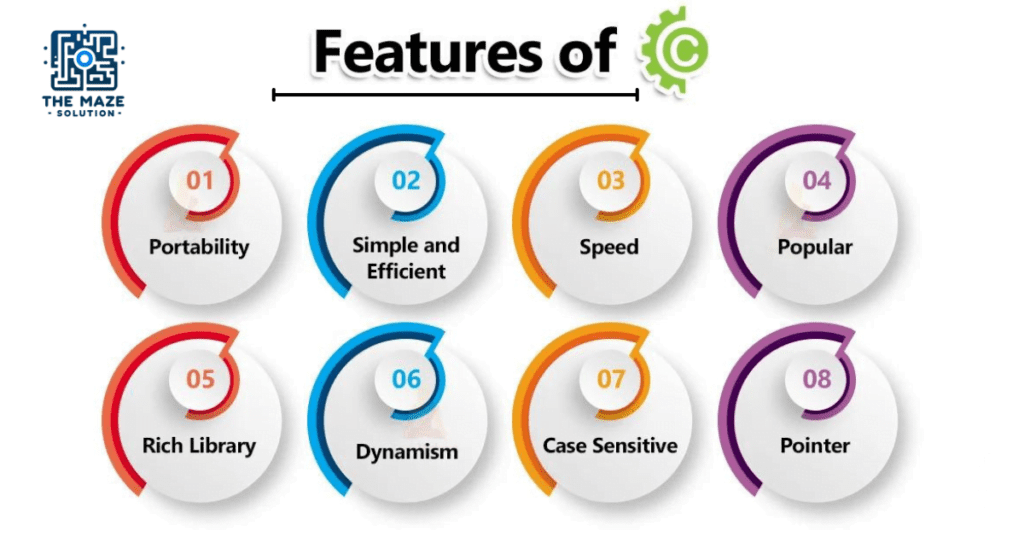10 Fascinating Facts About C Programming That Will Blow Your Mind!

Discovering the Origin of C Programming
C programming has a rich and fascinating history. Created in the 1970s by Dennis Ritchie at Bell Labs, it was designed to improve upon the B language. Ritchie’s efforts bore fruit when C became the foundation for the UNIX operating system, revolutionizing the way we interact with computers.
The significance of C in programming cannot be overstated. It laid the groundwork for many modern programming languages and systems. Without C, the tech landscape as we know it would be dramatically different.
This blog post will take you on a tour through ten mind-blowing facts about C programming. These facts highlight its importance, versatility, and lasting impact on the world of software development.
The Origin of C Programming
C programming’s story begins with Dennis Ritchie’s vision of an efficient and powerful language. Born out of necessity, C was created to support the development of the UNIX operating system. Ritchie’s innovative design gave birth to a language that was both versatile and practical.
The creation of C marked a significant milestone in the evolution of programming languages. It bridged the gap between machine-level programming and high-level abstract code, making it easier for developers to write efficient, maintainable software.
Key figures, such as Brian Kernighan and Ken Thompson, also played pivotal roles in the development and popularization of C. Their contributions helped establish C as a staple in the programmer’s toolkit, influencing countless other languages and systems.
C Programming is the Foundation of Many Languages
Many of today’s most popular programming languages owe their existence to C. Languages like C++, Java, and Python were heavily influenced by C’s design principles. This foundational influence underscores the importance of understanding C for any aspiring programmer.
C’s syntax and structure have become the blueprint for numerous languages. By learning C, programmers gain insights into the architecture and functionality of these modern languages, providing a deeper understanding of their inner workings.
The reach of C extends beyond just syntax. Its philosophy of simplicity and efficiency has inspired generations of programmers, cementing its place as a vital component in the evolution of software development.
Facts About C: The Power of Simplicity and Efficiency
One of C’s defining characteristics is its simplicity combined with raw power. Unlike many high-level languages, C offers direct access to memory through pointers, giving developers fine-grained control over their programs.

This power comes with significant efficiency. C’s performance is unmatched, making it ideal for applications where speed and resource management are critical. From operating systems to embedded systems, C’s efficiency shines through.
C’s simplicity does not mean it lacks depth. On the contrary, its minimalist design allows for a profound understanding of how software interacts with hardware. This knowledge is invaluable for any programmer looking to optimize their code.
Interesting Facts About Programming: C’s Role in Operating Systems
C’s influence is perhaps most evident in the realm of operating systems. UNIX, one of the most important and influential operating systems, was written in C. This choice allowed UNIX to be portable across different hardware platforms, a groundbreaking innovation at the time.
The development of UNIX showcased C’s strengths in system programming. Its ability to produce high-performance, efficient code made it the language of choice for operating system development.
Other operating systems, including Linux, have followed in UNIX’s footsteps, relying on C for their core functionality. This widespread adoption underscores the enduring relevance of C in system-level programming.
Is C Language Case Sensitive?
Understanding Case Sensitivity in C
One of the fundamental technical details that programmers must understand about C is its case sensitivity. Case sensitivity means that the C language distinguishes between uppercase and lowercase letters in variable names, function names, and other identifiers. This distinction is a crucial aspect of how C interprets and executes code.
Examples of Case Sensitivity
To illustrate, consider the following examples:
cCopy codeint Var = 10;
int var = 20;
In this code snippet, Var and var are treated as two distinct variables. Even though their names differ only by case, the C compiler recognizes them as separate identifiers with their own unique memory locations and values.
Similarly, function names also exhibit case sensitivity:
cCopy codevoid PrintMessage() {
printf("Hello, World!\n");
}
void printmessage() {
printf("Goodbye, World!\n");
}
Here, PrintMessage and printmessage are two different functions. Calling one will not invoke the other, even though their names look very similar.
Potential Pitfalls of Case Sensitivity
Case sensitivity can lead to subtle and hard-to-detect bugs if not carefully managed. For example:
cCopy codeint value = 100;
int Value = 200;
printf("%d\n", value); // Prints 100
printf("%d\n", Value); // Prints 200
In this scenario, accidentally using Value instead of value (or vice versa) can result in unexpected behavior, as the program will reference a different variable than intended. Such issues can be challenging to debug, especially in large codebases where similar names are used frequently.
Best Practices to Manage Case Sensitivity
To avoid problems related to case sensitivity, programmers should follow best practices, including:
- Consistent Naming Conventions: Adopt a consistent naming convention, such as using camelCase for variables and functions. For example, use
userInputandcalculateSuminstead of mixing styles. - Descriptive Identifiers: Use descriptive and distinct names for variables and functions to reduce the likelihood of confusion. For example, prefer
totalAmountoveramt. - Code Reviews: Conduct regular code reviews to catch potential issues related to case sensitivity and ensure adherence to naming conventions.
- IDE Features: Utilize features in Integrated Development Environments (IDEs) that highlight or autocomplete identifiers, helping to avoid accidental case mismatches.
Importance of Understanding Case Sensitivity
Understanding case sensitivity is crucial for writing clear and maintainable C programs. It ensures that the code behaves as expected and reduces the likelihood of errors caused by mistyped identifiers. By being mindful of case sensitivity, programmers can avoid many common pitfalls and write more robust, error-free code.
Fun Facts About Coding: The Versatility of C
C’s versatility is one of its most appealing attributes. It can be used in a wide range of applications, from embedded systems and game development to high-performance computing and scientific research.
Embedded systems, in particular, benefit from C’s efficiency and low-level access to hardware. Devices such as microcontrollers, sensors, and other IoT components often rely on C for their firmware.
In the world of game development, C has also made its mark. Many classic games were developed using C, taking advantage of its performance to create smooth and responsive gameplay experiences.
C’s Influence on Software Development Practices
Beyond its technical merits, C has significantly influenced software development practices. It has shaped modern methodologies, coding standards, and best practices that developers use today.
C’s emphasis on structured programming and modular design has set the stage for current practices in software engineering. These principles promote code readability, maintainability, and reusability.
The impact of C is also seen in coding standards, such as those defined by organizations like the International Organization for Standardization (ISO). These standards help ensure that C code remains consistent and reliable across different projects and platforms.
Interesting Facts About Programming: C’s Portability and Performance
C stands out for its portability, meaning code written in C can run on various platforms with minimal modifications. This portability is a testament to C’s design and has contributed to its widespread adoption.
Performance is another area where C excels. Its ability to generate efficient machine code makes it suitable for performance-critical applications. From real-time systems to high-frequency trading, C’s performance capabilities are unparalleled.
Examples of C’s portability and performance can be seen in projects like the GNU Compiler Collection (GCC) and the Linux kernel. These projects demonstrate how C’s strengths enable it to thrive in diverse environments.
The Community and Resources Behind C Programming
The C programming community is vibrant and supportive. Countless resources are available for those looking to learn and master C, from books and websites to forums and online courses.
Books like “The C Programming Language” by Brian Kernighan and Dennis Ritchie are considered essential reading for any C programmer. Websites such as GeeksforGeeks and Stack Overflow provide valuable tutorials and community support.
Forums and online communities offer a space for programmers to share knowledge, ask questions, and collaborate on projects. These resources ensure that learning C is accessible and engaging for everyone.
Fun Facts About Coding: Famous Programmers Who Started with C
Many notable programmers and tech leaders began their careers with C. Learning C provided them with a strong foundation that contributed to their success in the tech industry.
One such programmer is Linus Torvalds, the creator of the Linux kernel. His work on Linux, which is primarily written in C, has had a profound impact on computing and open-source software.
Another example is Bjarne Stroustrup, who developed C++. His background in C was instrumental in creating a language that built upon C’s strengths while introducing new features and capabilities.
Conclusion
C programming is more than just a language; it’s a legacy that continues to shape the world of software development. From its origins at Bell Labs to its influence on modern languages and systems, C’s impact is undeniable.
We’ve explored ten fascinating facts about C programming, highlighting its importance, versatility, and ongoing relevance. For programmers, software engineers, students, and professionals alike, understanding C is a valuable asset.
If you’re inspired to learn more about C programming, consider exploring the many resources available. Whether you’re a beginner or looking to deepen your expertise, C offers endless opportunities for growth and innovation.
Dive into the world of C programming and discover the possibilities it holds for your future in tech. Happy coding!





